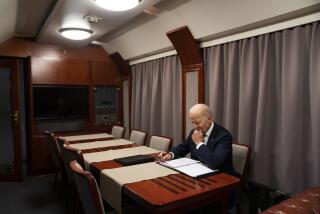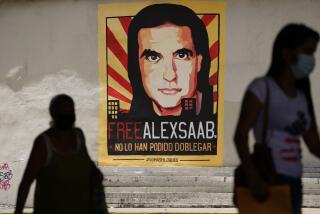U.S. foreign policy, close to home
The United States cannot afford to keep putting Latin America on the back burner as it focuses the bulk of its attention on Asia, Europe and the Middle East. The Western Hemisphere holds significant strategic interest for the U.S. — as well as enormous promise.
Efforts should be focused in four key areas: building a democratic movement, enhancing trade and economic ties, cooperating on energy issues and building and strengthening security alliances.
It’s no coincidence that increased prosperity has followed in the wake of stronger democratic institutions in Latin America. Nor is it surprising that Cuba, which is still not a democracy, is struggling. Looking toward a post-Castro era, Cubans are taking increasingly bold actions to secure for themselves the political and economic freedoms enjoyed by the majority of their fellow Latin Americans. The United States should support them by finding new ways to increase connectivity among Cubans and expand access to 21st century technologies on the island.
We also need to assist Latin America’s many fledgling democracies. Free elections are crucial, but they aren’t enough to secure a democracy. As we’ve seen in Venezuela, Nicaragua, Ecuador and Bolivia, elected leaders can use democratically obtained power to abuse their people, attack fundamental freedoms and weaken civil society. Sadly, too many Latin American nations seem to have forgotten their own struggles against authoritarian regimes and are standing by quietly while freedom is denied in Cuba and democracy attacked in neighboring countries. We must urge all our fellow democracies in the Western Hemisphere to be defenders of freedom across the region.
A new challenge could face us soon, as Venezuela holds its presidential election in October. If Hugo Chavez loses his election or is unable to continue to govern, other nations in the hemisphere should be proactive and resolute in making clear that they won’t tolerate any attempt to suspend the constitutional order in Venezuela.
Latin America’s recent gains in prosperity and upward mobility have helped strengthen democracies and create new consumers for U.S. products and services. After decades of pervasive dictatorships, wars and corruption, many Latin American nations have emerged as examples of the good things that happen when free enterprise is allowed to take root. Whereas countries such as Colombia and Chile were once overwhelmed by conflicts that required international aid or intervention, they are now engaging the world as never before, becoming more self-sufficient and providing the U.S. with new economic opportunities.
Sadly, there is a growing sense of protectionism taking root in some countries, and that tide must be reversed. Last year, Congress finally approved free-trade deals with Colombia and Panama, which will soon take effect and help reduce trade barriers for Americans to sell their products and services abroad, just as past deals with Chile, Peru, Central America and Mexico have done. These recent deals should now serve as jumping-off points for bolder action through the Trans-Pacific Partnership, which should include Canada and Mexico, and can eventually serve as the basis for creating a hemisphere-wide free-trade zone.
On the energy front, the Western Hemisphere needs to establish itself as a democratic, peaceful and stable alternative to the Middle East in global energy production. An energy alliance made up of the U.S., Canada, Mexico, Colombia, Brazil and a post-Chavez Venezuela would help accomplish this goal. Building the Keystone pipeline and implementing the trans-boundary energy agreement being negotiated with Mexico are also crucial steps toward that goal.
From a security standpoint, violent organized crime, which has devastated the region and brought tragic insecurity, must be addressed as a necessary precursor to economic prosperity and stable democratic institutions. Despite the exhortations of some, this can’t happen through the legalization or decriminalization of the drug trade. Instead, we should revise outdated Cold War-era restrictions that impede more robust security cooperation with governments in the region.
Colombia has become a security success story, not because its leaders legalized drugs but because they embraced a smart strategy and had the courage to fight the drug cartels and the narco-terrorists of the FARC. Out of that struggle, Colombia has emerged as a security exporter with robust government institutions and a successful free-enterprise system. But the fight is not finished, and the U.S. must continue its support, including providing Colombia access to armed, unmanned aerial vehicles. Countries like Colombia can then use their expertise to be security exporters to the emerging trouble spots of Honduras and Guatemala.
Finally, Iran keeps trying to grow its influence in the region, seeking allies throughout the hemisphere in order to evade sanctions, collect intelligence and create a capability to carry out terrorists attacks. The democracies of the region must unite to prevent this.
Over the three years that the Colombia and Panama free-trade agreements were blocked, our patient friends in Latin America were left to wonder whether the U.S. still cared about them. Now is the time to prove, through words and deeds, that we are committed to help shape the 21st century as one of unprecedented prosperity and security in the Western Hemisphere.
Marco Rubio is a Republican U.S. senator from Florida.
More to Read
A cure for the common opinion
Get thought-provoking perspectives with our weekly newsletter.
You may occasionally receive promotional content from the Los Angeles Times.






